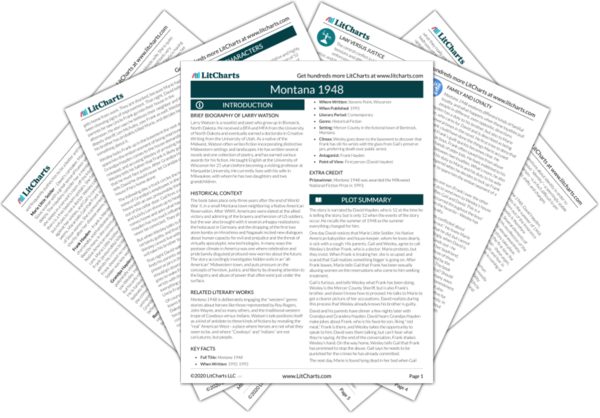The central conflict in Montana 1948 concerns the tensions and differences between the practice and enforcement of law and the more abstract notion of justice, and the realization that the law does not or cannot always provide justice. The book repeatedly notes how the practice and enforcement of law is susceptible to public opinion and abuses of power.
Dr. Frank Hayden takes advantage of the fact that the his brother, Sheriff Wesley Hayden, does not have jurisdiction in the reservations, and abuses Native American women who trust him to provide care for them. His abuse is enabled by a legal kind of technicality. What’s more, the Sherriff is an elected official in this town. That means Wesley must make sure he has the support of the people of the town before he makes an arrest. His son David notes, in fact, that his father is at his most social when he is closing in on a suspect. This is in part the reason Gail Hayden, Wesley’s wife, wishes he were a lawyer and not a sheriff—perhaps he could pursue justice in the courtroom in a way he could not on the streets.
The arrest of Frank Hayden proves especially difficult, because the law is not well equipped to deliver justice. The fact that public opinion of Frank Hayden is so high—and the public opinion of Native Americans is generally low—makes it unlikely that he will be indicted on the murder of Marie Little Soldier, though Wesley is sure of his brothers’ guilt. The power that the Hayden Family has in this town is another factor that corrupts the law. Grandpa Hayden (Julian) will make sure that his favorite son Frank does not go to jail—his wealth and influence allow him to bend the law in his favor.
Wesley himself is often torn about his duty as the law describes it and his duty to justice. He knows the law, in practice, will not convict his brother. Yet he decides to continue pressing charges anyway. He refuses to be personally responsible for the unjust release of his brother. Gail also pursues justice over law—though her husband has no jurisdiction on the reservations, and despite the fact that the law has historically failed to protect the rights of Native Americans like Marie Little Soldier, she insists that the Sherriff do an investigation.
The novella thus portrays how the ideal of justice is often unmet by the practical realities of the legal system in the United States, particularly for the less powerful. Following WWII, the US was experiencing a kind of rude awakening, as the horrors of the war ushered in a clash between idealism and realism—Watson is making a powerful point about the reality of corruption, compromises, and abuses that are present even in “all-American” small-town life. The book takes a stand against the notion that the US is idyllically “free” or “fair” by depicting the profound difference between law and justice.
Law versus Justice ThemeTracker

Law versus Justice Quotes in Montana 1948
The sheriff of Mercer County was elected, but such was my grandfather’s popularity and influence—and the weight of the Hayden name—that it was enough for my grandfather to say…now I want my son to have this job…It would never have occurred to my father to refuse.
“That’s not the way it works. You know that. Sins—crimes—are not supposed to go unpunished.”
Even then I knew what the irony of the conversation was: the secretary lecturing the lawyer, the law enforcement officer, on justice.
“You know what your granddad said it means to be a peace officer in Montana? He said it means knowing when to look and when to look away.”
He had long since stopped being my father. He was now my interrogator, my cross-examiner. The Sheriff. My Uncle’s brother.
He was building a case, and my father did this the same way he ran for reelection—by gathering in friends and favors. I suppose he was collecting evidence as well, but that part was never as obvious to me. What he seemed intent on doing—just as boys at play do, just as nations at war do—was getting people to be on his side.
“Screwing an Indian. Or feeling her up or whatever. You don’t lock up a man for that. You don’t lock up your brother. A respected man. A war hero.”
“He’s guilty as sin, Gail. He told me as much…Goddamn it! What could I have been thinking of? Maybe a jury will cut him loose. I won’t. By God, I won’t.”
I wondered again how it could have happened—how it could be that those two people who only wanted to do right, whose only error lay in trying to be loyal to both family and justice, were now dispossessed, the ones forced to leave Bentrock and build new lives.
I find history endlessly amusing, knowing, as I do, that the record of any human community might omit stories of sexual abuse, murder, suicide.
















